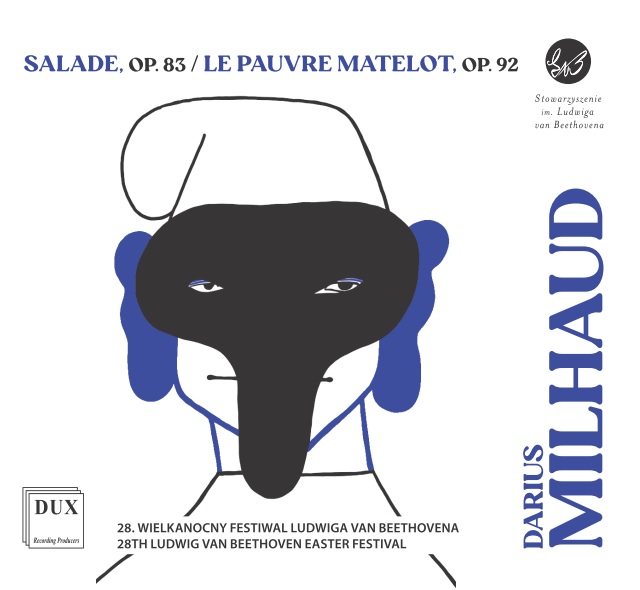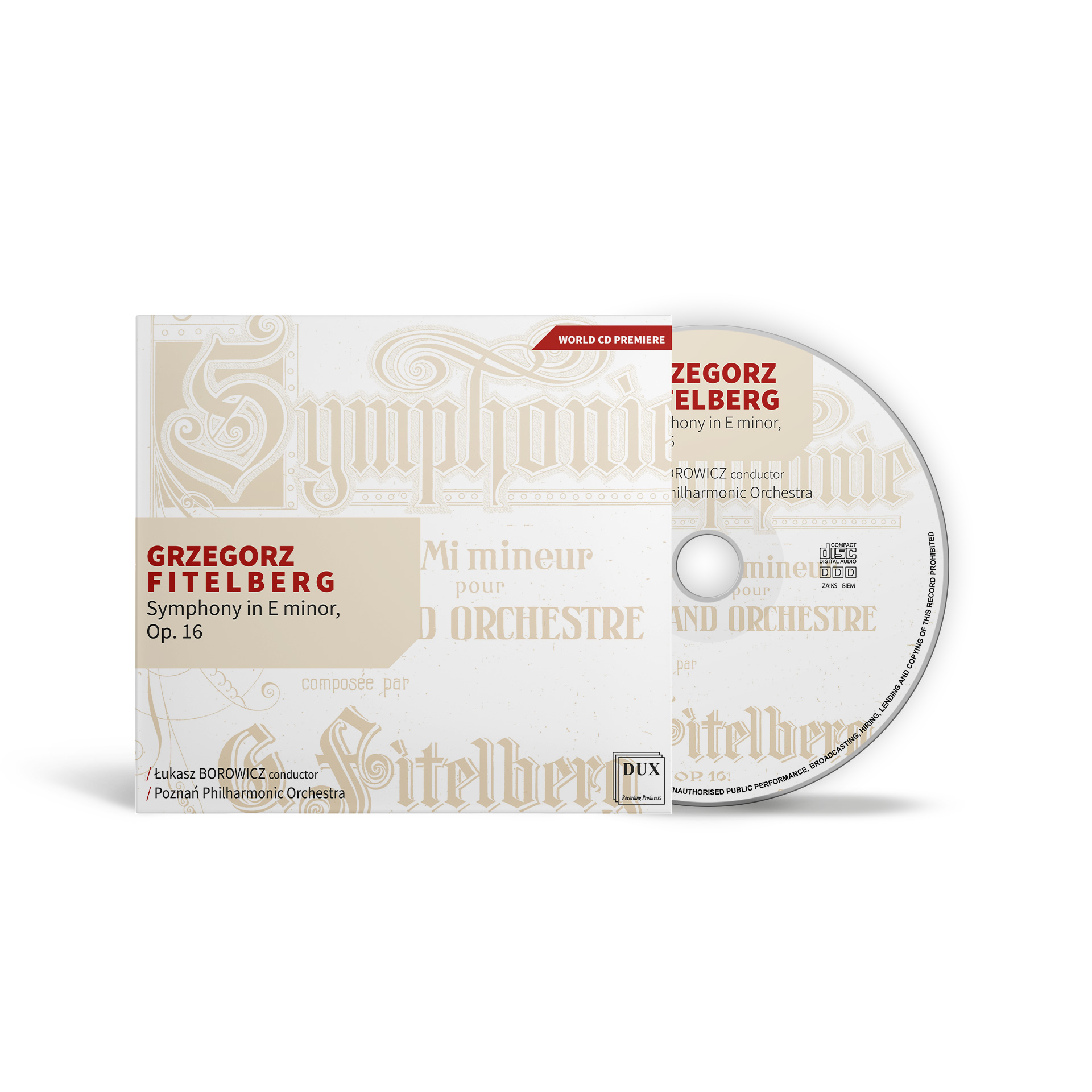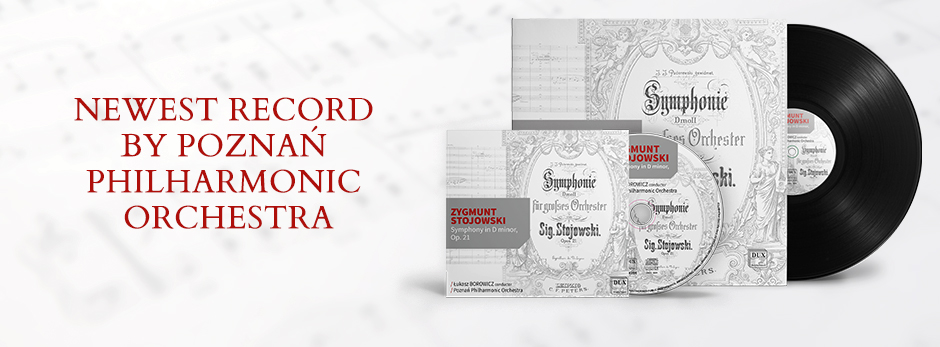news
Over Christmas and the New Year’s period, the box office of Poznań Philharmonic is open at the following dates:
- 22-26 December: CLOSED
- 27 December: 5:00 – 6:00 p.m.
- 28 December: 5:00 – 7:30 p.m.
- 29 December: 6:00 – 8:30 p.m.
- 30 December: 1:00 – 5:00 p.m.
- 31 December: 5:00 – 7:00 p.m.
- 1 January 2026: 5:00 – 7:30 p.m.
- 2 January 2026: 1:00 – 8:30 p.m.
- 3–6 January 2026: CLOSED
You are welcome to purchase your tickets online.
The newest record by Poznań Philharmonic Orchestra has reached good music shops. Published by DUX, the ensemble’s “Zygmunt Stojowski, Symphony in D minor op. 21” recorded under Łukasz Borowicz has been released in CD and LP formats, and is also available on the publisher’s webpage www.dux.pl., as well as in streaming services.
Born in 1870, Zygmunt Stojowski belonged to a generation merely a dozen or so years older than artists of the Młoda Polska (Young Poland) movement. Piano virtuoso, friend of Ignacy Jan Paderewski, tireless champion of the cause of Poland regaining independence, Stojowski spent most of his life in the United States (he died in New York in 1946), where, side by side with his concert activity, he also developed a career in education.
One of his early works, Symphony in D minor, brought him the First Prize at a composer competition organised by Ignacy Jan Paderewski at the Gewandhaus in Leipzig. Following the piece’s staggering success, its score and piano reduction were released by the prestigious publishing house Peters Edition. The list of premiere performances is truly imposing: the first concert in Berlin was followed by events in Leipzig, Paris, Krakow and New York. The symphony was also performed at the ceremonious concert to inaugurate operation of the Warsaw Philharmonic Society on 5 November 1901 with the newly-established orchestra conducted by Emil Młynarski.
Co-financed by Minister of Culture and National Heritage with resources from Culture Promotion Fund under programme “Musical Trace” operated by National Institute of Music and Dance.

The concert featuring the winner of 19th International Fryderyk Chopin Piano Competition in Warsaw had been announced for quite some time – since the publication of the piano contest’s results, we have known that the pianist to perform at A. Mickiewicz University Auditorium on Monday evening is Eric Lu (who, incidentally, already played with the Poznań Philharmonic Orchestra under Łukasz Borowicz at 36th International Festival “Chopin w barwach jesieni”, or “Chopin in the Colours of Autumn” in Ostrów Wielkopolski in 2017).
This time, the composition the winner of the 19th Fryderyk Chopin piano event performs with our orchestra is the Piano Concerto in F minor, Op. 21. Besides Poznań, he plays the same piece with the National Symphony Orchestra of the Polish Radio in Katowice, and gives a recital of Chopin’s music at the National Forum of Music in Wrocław – the three are the only musical institutions in Poland to host the winner of this year’s Chopin Competition right after the event.
However, on Monday evening we have one more surprise for music lovers: the opening part of the concert features Fryderyk Chopin’s compositions for solo piano performed by Kevin Chen, holder of the 2nd Prize of the 19th International Fryderyk Chopin Piano Competition! Thus, it appears there are no fewer than two reasons to make this evening truly memorable!
Good run in French media continues. Click Musique!, the French magazine dedicated to classical and jazz music, publishes in its September issue a review of the album “Darius Milhaud, Salade op. 83 / Le pauvre matelot op. 92” recorded by the Poznań Philharmonic Orchestra under Łukasz Borowicz at a concert of the “Unknown Operas” series which was held at the National Philharmonic Hall in Warsaw during 28th Easter Ludwig van Beethoven Festival. And just like the ensemble’s album “Grzegorz Fitelberg, Symfonia e-moll op. 16” also recorded with Łukasz Borowicz, which was given the Sélection ClicMag! recommendation in July, this release, too, has been awarded the distinction.
The renowned French music critic Jean-Charles Hoffelé writes about the recording:
“It is difficult to find in Darius Milhaud’s rarely recorded operatic oeuvre two more disparate works than the colourful, even tangy fantasy Salad, and the tragic, ornament-free opera Le pauvre matelot with Jean Cocteau’s libretto so excellent as to inspire the author of Bolivar to create a poignant drama. Milhaud held this three-act opera in such esteem that he recorded it himself. Well aware of that, Łukasz Borowicz does not try to emulate the bitterness of that historic recording.
Instead, what he offers is a somewhat detached attitude that provides Cocteau’s text with enough space to resonate with all its ambiguities; at the same time, Borowicz poetically renders the murderer’s dilemmas and the changing atmosphere at the bar. Singers very meticulously elaborated their French parts, and Krystian Krzeszowiak’s Matelot may appear even more convincing than the sharper-voiced Jean Giraudeau’s.
The Provençal-hue-spiced grotesque Salade is unrivalled: the ballet is conducted ebulliently, while “furniture music” of the entries and short instrumental interludes is contrasted with fragments spoken and sung by a commedia-dell’arte-like troupe led in a furious tempo by Mateusz Zajdel’s Pulcinella; this is what ultimately makes the album exceptional.
And if Łukasz Borowicz and his excellent troupe were to reach for Esther de Carpentras tomorrow?”

Darius Milhaud
Salade, Op. 83 – ballet chanté in 2 acts
Le pauvre matelot, Op. 92 – opera in 3 acts
Magdalena LUCJAN – soprano
Natalia RUBIŚ – soprano
Krystian Adam KRZESZOWIAK – tenor
Krzysztof LACHMAN – tenor
Mateusz ZAJDEL – tenor
Robert GIERLACH – baritone
Adrian JANUS – baritone
Wojciech GIERLACH – bass
Łukasz BOROWICZ – conductor
Poznań Philharmonic Orchestra
Ladies and Gentlemen,
we wish to inform you that the box office of the Poznań Philharmonic opens on 1 September (A. Mickiewicz University Auditorium, 1, Wieniawskiego st., entrance hallway).
In 2025/2026 artistic season, the box office operates:
- September: Monday-Friday, 1-5 p.m.,
- October-June: Tuesday-Friday, 1-5 p.m.,
- days of concerts organised by Poznań Philharmonic at University Auditorium: box office opens one hour prior to concert and closes at end of intermission.
***
Reserved DL and SG season tickets can be purchased between 1 September and 30 September.
Reserved KP season tickets can be purchased between 8 September and 19 September.
Reserved MW season tickets can be purchased between 1 October and 31 October.
Holders of 2024/2025 electronic tickets are requested to carry these while purchasing 2025-2026 season tickets.
***
Individual ticket sales at Philharmonic box office, online ticket sales, as well as sales of tickets at Centrum Informacji Kulturalnej (Culture Information Centre, 44, Ratajczaka st.) commence on 1 October.
***
Individual ticket reservations, as well as enquiries regarding the new season can be made by mail at: rezerwacje@filharmoniapoznanska.pl, or by phone: (+48) 61 415 63 37; (+48) 61 852 22 66.
In September, we shall remain at your disposal in University Auditorium hallway at box office opening times. However, with regard to reservations only, you are requested to contact us remotely (by mail or by phone).
***
Poznań Philharmonic reserves the right to change the above schedule of season and individual ticket sales, as well as to alter the calendar of concerts.

Click Musique!, the French magazine dedicated to classical and jazz music, publishes in its July-August edition a review of the album “Grzegorz Fitelberg, Symfonia e-moll op. 16” (Grzegorz Fitelberg, Symphony in E minor, Op. 16) recorded by Poznań Philharmonic Orchestra under Łukasz Borowicz. The well-known French critic Jean-Charles Hofelé writes about the recording awarded the Sélection ClicMag! distinction:
“Shall Grzegorz Fitelberg forever remain forgotten amongst the composers of the Młoda Polska (Young Poland) movement? His illustrious conducting career – to a large degree concentrated on advocating and promoting works by Karol Szymanowski and Mieczysław Karłowicz – pushed Fitelberg-composer into oblivion. The discovery of his 1904 Symphony, and its first-ever recording made by Łukasz Borowicz and his Poznań-based ensemble [Poznań Philharmonic Orchestra] will unquestionably change this situation. Clearly inspired by Richard Strauss, the masterly orchestration of this voluminous score of fulgent architecture puts the orchestra in the spotlight. The symphony is testimony to mature artistic inventiveness, which produces in the Andante a motif of profound beauty.
Standing at the very turning point of different epochs, the work’s dark keys appear to harbinger Szymanowski’s Symphony No. 2. In the wake of the idiosyncrasies of the Mahler-redolent Scherzo (Fitelberg being an ardent proponent of the author of Song of the Earth), the captivating, feverish final part ushers in a charming post-Romantic quality. And all this without falling into epigonism.
Łukasz Borowicz is renowned for the consistency with which he carries out his projects; without a doubt, he going to discover for us the Violin Concerto, “Spring”, the Rhapsodies, and Symphony No. 2.”
1. Box office of Poznań Philharmonic reopens after summer break on 1 September 2025.
In 2025/2026 artistic season, the box office operates:
- September: Monday-Friday, 1-5 p.m.,
- October-June: Tuesday-Friday, 1-5 p.m.,
- days of concerts organised by Poznań Philharmonic at University Auditorium: box office opens one hour prior to concert and closes at end of intermission.
2. Reserved DL and SG season tickets can be purchased as at 1 September.
3. Reserved KP season tickets can be purchased as at 8 September.
4. Reserved MW season tickets can be purchased as at 29 September.
5. Individual ticket sales at Philharmonic box office, online ticket sales, as well as sales of tickets at Centrum Informacji Kulturalnej (Culture Information Centre, 44, Ratajczaka st.) commence on 1 October.
6. Holders of 2024/2025 electronic tickets are requested to carry these while purchasing 2025-2026 season tickets.
7. Individual ticket reservations, as well as enquiries regarding the new season can be made by mail at: rezerwacje@filharmoniapoznanska.pl, or by phone: (+48) 61 415 63 37; (+48) 61 852 22 66. In September, we shall remain at your disposal in University Auditorium hallway at box office opening times. However, with regard to reservations only, you are requested to contact us remotely (by mail or by phone).
8. Poznań Philharmonic reserves the right to change the above schedule of season and individual ticket sales, as well as to alter the calendar of concerts.
During summer break (30 June – 31 August 2025), the box office will be CLOSED.
Box office reopens on Monday, 1 September 2025.
In 2025/2026 artistic season, the box office operates:
- September: Monday-Friday, 1-5 p.m.,
- October-June: Tuesday-Friday, 1-5 p.m.,
- days of concerts organised by Poznań Philharmonic at University Auditorium: box office opens one hour prior to concert and closes at end of intermission.
We inform that the ticket office of Poznan Philharmonic will be closed from the 17th of April till the 21st of April as well as the 1st of May till 5th of May.
We encourage you to purchase the tickets online.
Like every year, in the 2025/26 artistic season Poznań Philharmonic is planning to prepare for you musical evenings within the DE LUXE (DL), STAR ZONE (SG) and POZNAŃ CONCERTS (KP) season tickets.
If you are interested in the purchase of season tickets for these concerts, please fill in the or-der form below and submit it in the ticket office of Poznań Philharmonic until the 27th of June 2025.
The estimated date of the collection of the tickets is September 2025. The details will be given later – please track the information on our website www.filharmoniapoznanska.pl.
Print the order form for DL | SG | KP season tickets (season 2025/26)




